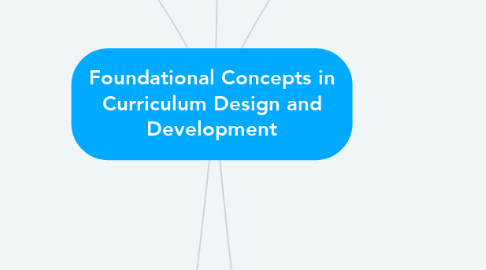
1. THE LEARNING DOMAINS
1.1. Cognitive
1.1.1. Knowledge
1.1.2. Comprehension
1.1.3. Application
1.1.4. Analysis
1.1.5. Synthesis
1.1.6. Evaluation
1.2. Affective
1.2.1. Receiving
1.2.2. Responding
1.2.3. Valuing
1.2.4. Organization
1.2.5. Characterization
1.3. Psychomotor
1.3.1. Perception
1.3.2. Set
1.3.3. Guided Response
1.3.4. Mechanism
1.3.5. Complex Overt Response
1.3.6. Adaptation
1.3.7. Origination
2. SCHOOL CURRICULUM AND INSTRUCTION
2.1. Definition of a School Curriculum
2.1.1. "What are the subject list offered by the school to the learners?"
2.1.2. “Why were those subjects chosen and not others?”
2.1.3. “Who chose these subjects and experiences?”
2.2. Reasons for Designing a School Curriculum
2.2.1. Schools serves the needs of the child.
2.2.2. Should help all learners to develop their mental capacity
2.2.3. Should acquire manipulative or technical skills.
2.2.4. Should develop their emotional state.
2.3. Factors that Affect a School Curriculum
2.3.1. National Goals of Education
2.3.2. Number of Subject Options Available
2.3.3. The Learner
2.3.4. Resource Availability
2.4. The Process of Designing a School Curriculum
2.4.1. Diagnosis of Needs
2.4.2. Formulation of Objectives
2.4.3. Selection of Content
2.4.4. Organization of Content
2.4.5. Selection of Learning Experiences
2.4.6. Organization of Learning Experiences
2.4.7. Evaluation
2.5. The Shared and Unique Aspect of Curriculum Development and Instructional Development
2.5.1. Writing objectives.
2.5.2. Sequence Objectives.
2.5.3. Determine Student Needs and Interests.
2.5.4. Develop Curriculum Materials.
2.5.5. Evaluate Curriculum Materials effectiveness.
3. CONCEPT OF CURRICULUM
3.1. Curriculum and its Types
3.1.1. Formal Curriculum
3.1.2. Informal Curriculum
3.1.3. Actual Curriculum
3.1.4. Other Terminologies
3.1.4.1. Core
3.1.4.2. Extra-Mural
3.1.4.3. Hidden
3.2. Curriculum Perspectives
3.2.1. Rationalist
3.2.2. Empiricist
3.2.3. Pragmatist
3.2.4. Existensialist
3.3. Elements of Curriculum
3.3.1. Purpose
3.3.1.1. Reflects the relevance of whatever the society deems to be important.
3.3.2. Content or Subject Matter
3.3.2.1. Content must be applicable to the solution of the problems affecting the Society which uses it.
3.3.3. Methods
3.3.4. Evaluation
4. APPROACHES TO CURRICULUM DEVELOPMENT
4.1. Curriculum Planning
4.1.1. Key Determinants are
4.1.1.1. The Learners
4.1.1.2. The Knowledge
4.1.1.3. The Society
4.1.2. should focus on
4.1.2.1. Learning Theories
4.1.2.2. Acquiring Knowledge
4.1.2.3. Societal Considerations like
4.1.2.3.1. Political
4.1.2.3.2. Social
4.1.2.3.3. Economic
4.1.2.3.4. Technological
4.1.2.3.5. Environmental
4.1.3. includes Sources of Design
4.1.3.1. Science
4.1.3.2. Society
4.1.3.3. Eternal and Divine Sources
4.1.3.4. Knowledge
4.1.3.5. Learner
4.2. Curriculum Design
4.2.1. Models of Curriculum Design
4.2.1.1. The Objectives Model
4.2.1.2. The Process Model
4.2.1.3. Tyler's Model
4.2.1.4. Wheeler's Model
4.2.1.5. Kerr's Model
4.2.2. Dimensions of Curriculum Design
4.2.2.1. Basics
4.2.2.2. Alignment
4.2.2.3. Scope
4.2.2.4. Integrations
4.2.2.5. Continuity and Progression
4.2.2.6. Sequence
4.3. Curriculum Implementation
4.3.1. Factors Affecting includes
4.3.1.1. The Teacher
4.3.1.2. The Learner
4.3.1.3. Resource Materials and Facilities
4.3.1.4. Stakeholders
4.3.1.5. The School Environment
4.3.1.6. Culture and Ideology
4.3.1.7. Instructional Supervision
4.3.1.8. Assessment
4.4. Curriculum Evaluation
4.4.1. Approaches
4.4.1.1. Bureaucratic
4.4.1.2. Autocratic
4.4.1.3. Democratic
4.4.1.4. Norm-referenced
4.4.1.5. Criterion-referenced
4.4.2. Forms of Evaluation
4.4.2.1. Formative
4.4.2.2. Summative
5. CURRICULUM, INSTRUCTION AND ASSESSMENT IN THE CONTEXT OF SCIENCE CURRICULUM
5.1. Curriculum Instruction and Assessment Triad
5.1.1. Assessment
5.1.2. Curriculum
5.1.3. Instruction
5.2. Salient Features of Science and Math Instruction
5.2.1. Curriculum promotes learning with understanding.
5.2.2. Conceptual Understanding in Advanced Math and Science Courses
5.2.2.1. Curriculum
5.2.2.2. Consideration for the Learners
5.2.2.3. Learning Activities
5.2.2.4. Assessment
5.2.3. The Teachers' Role in Instruction
5.2.4. The Learners' Role in Instruction
5.3. Assessment in Science and Math Instruction
5.3.1. Formative Assessment
5.3.2. Summative Assessment
5.3.3. Features of Effective Assessment
